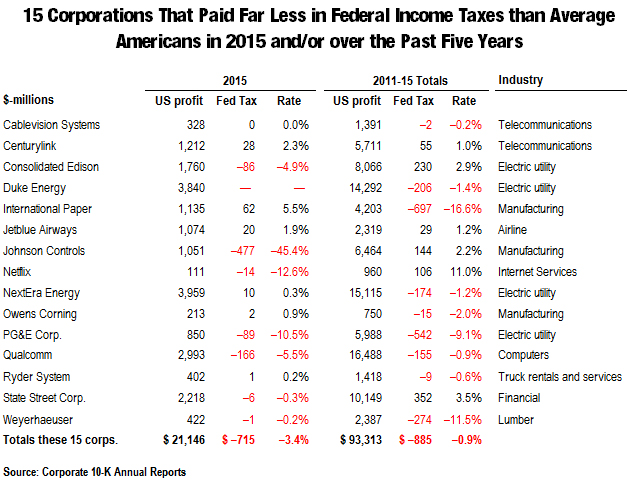April 11, 2016 12:31 PM | Permalink | ![]()
This CTJ report illustrates how profitable Fortune 500 companies in a range of sectors of the U.S. economy have been remarkably successful in manipulating the tax system to avoid paying even a dime of tax on billions of dollars in U.S. profits. These 15 corporations’ tax situations shed light on the widespread nature of corporate tax avoidance. As a group, the 15 companies paid no federal income tax on $21 billion in profits in 2015. Even more astonishingly, as a group they paid no federal income tax on $93 billion in profits over the past five years. Seven of these companies received federal tax rebates in 2015, and almost all paid exceedingly low rates over five years.
Companies Represent Diverse Economic Sectors
The companies profiled here represent a range of segments of the U.S. economy:
- The telephone and Internet service provider Centurylink enjoyed $1.2 billion in U.S. profits last year, and paid a federal tax rate of just 2.3 percent.
- Online video streaming service Netflix received a tax rebate of $14 million in 2015.
- Over the past five years, the manufacturer International Paper has paid no federal income taxes on $4.2 billion in U.S. profits.
- Ryder System, which provides truck rentals and related services, paid a 0.2 percent federal income tax rate in 2015 and over the past five years a negative 0.6 percent rate.
- California-based utility PG&E had sharply negative tax rates both in 2015 and over the five-year period.
All 15 companies’ effective federal income tax rates for 2015 and the 2011-15 period are shown in the table below.
Companies’ Low Taxes Stem from a Variety of Legal Tax Breaks
While recent policy discourse has focused on multinational corporations that use offshore tax havens to minimize their tax liability, the companies profiled here appear to be using a diverse array of other tax breaks to zero out their federal income taxes:[1]
Jetblue, PG&E and Ryder used accelerated depreciation, a tax break that allows companies to write off the cost of their capital investments much faster than these investments wear out, to dramatically reduce their tax rates. CTJ has estimated that closing the accelerated depreciation loophole could raise more than $428 billion over the next decade.[2] Both Congress and President Barack Obama, however, have supported expanding the scope of this tax break in recent years.
Netflix relied heavily on a single tax break — writing off the value of executive stock options for tax purposes — to zero out its tax liability in 2015, and enjoyed $250 million in stock option tax breaks over the past three years. Former U.S. Senator Carl Levin (D-MI) has estimated that this tax break will costs $23 billion over the next decade. [3] Netflix also reduced its tax rate using the research and experimentation credit.
International Paper has enjoyed more than $100 million in tax benefits for manufacturing over the past five years.
Qualcomm enjoyed more than $440 million in research and experimentation tax breaks over the past five years. The research tax credit has been criticized for rewarding companies for “research” they would have done anyway, as well as rewarding research in areas such as fast-food packaging. [4]

Corporate Tax Reform Should Repeal Tax Loopholes and Restore Overall Corporate Tax Revenues to a More Reasonable Level
In recent years, the public’s attention has been drawn to the elaborate tax avoidance mechanisms used by huge corporations such as General Electric, Apple, Microsoft and others. But as this report indicates, the scope of corporate tax avoidance goes well beyond these few companies and spans a wide variety of economic sectors. Moreover, the tax breaks that have allowed these companies to be so successful in their tax avoidance are, by and large, perfectly legal, and often have been on the books for decades.
As Congress focuses on strategies for revamping the U.S. corporate income tax, a sensible starting point should be to critically assess the costs of each of these tax breaks and to take steps to ensure that profitable corporations pay their fair share of U.S. taxes.
The next step is just as important. The revenues raised from eliminating corporate tax subsidies should not be given back to corporations in the form of tax-rate reductions, as corporate lobbyists and their allies inside the Washington Beltway argue. Instead, as the vast majority of Americans understand, these desperately needed revenues should be used to address our nation’s fiscal problems and to make critically needed public investments in our nation’s future.
[1] Accelerated depreciation and the stock options loophole, and how Congress could raise revenue by repealing them, are described in Citizens for Tax Justice, “Policy Options to Raise Revenue,” March 8, 2012. http://ctj.org/ctjreports/2012/03/policy_options_to_raise_revenue.php The “active financing exception” is described in Citizens for Tax Justice, “Don’t Renew the Offshore Tax Loopholes,” August 2, 2012. http://ctj.org/ctjreports/2012/08/dont_renew_the_offshore_tax_loopholes.php
[2] Citizens for Tax Justice, “Addressing the Need for More Federal Revenue,” July 8, 2014. https://ctj.sfo2.digitaloceanspaces.com/pdf/policyoptions2014.pdf
[3] Ibid.
[4] Citizens for Tax Justice, “Reform the Research Tax Credit — Or Let It Die,” December 4, 2013. http://ctj.org/ctjreports/2013/12/reform_the_research_tax_credit_–_or_let_it_die.php



